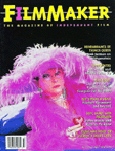 Back to selection
Back to selection
FILMMAKER FLASHBACK: FALL, 1993
Leading up to our 18th birthday, I’ll be revisiting on the blog one issue of Filmmaker a day. Today’s is Fall, 1993.
 Peter Bowen interviewed Derek Jarman about his Wittgenstein for our Fall, 1993 cover. Holly Willis interviewed D.A. Pennebaker and Chris Hegedus about their doc on the Clinton Presidential campaign, The War Room. And there is still some useful advice in this article by Daniel Einfeld, a producer of the indie hit My LIfe’s in Turnaround, on bartering and production placement. (In the Filmmaker office, this article is kind of infamous for having what is perhaps our worst article design ever, with floating clip-art dollar signs all over the page.) I interviewed Victor Nunez about his Ruby in Paradise, which introduced Ashley Judd to the world, and I was struck by this final exchange, occurring years before Twitter, internet journalism and the 24-hour cable news cycle really took hold.
Peter Bowen interviewed Derek Jarman about his Wittgenstein for our Fall, 1993 cover. Holly Willis interviewed D.A. Pennebaker and Chris Hegedus about their doc on the Clinton Presidential campaign, The War Room. And there is still some useful advice in this article by Daniel Einfeld, a producer of the indie hit My LIfe’s in Turnaround, on bartering and production placement. (In the Filmmaker office, this article is kind of infamous for having what is perhaps our worst article design ever, with floating clip-art dollar signs all over the page.) I interviewed Victor Nunez about his Ruby in Paradise, which introduced Ashley Judd to the world, and I was struck by this final exchange, occurring years before Twitter, internet journalism and the 24-hour cable news cycle really took hold.
Filmmaker: As someone who has been a part of the world of independent film as long as it’s defined itself as such, what advice would you give to beginning filmmakers?
Nunez: I think it takes a long time to learn to be a filmmaker. I used to say if I live to be 200, I might get what I need to do done. I’d tell them to not forget the past, even when you’re young. I know the temptation is to believe that everything that’s of any significance happened within the last six months. Have a sort of humorous sense that we live in a culture that is so event-oriented and so insure of itself that it has to feel like it’s in on the moment and movies don’t get done in moments. You have to at least develop in yourself a bit of a longer window or a long view of things. Maybe realize that you share things not just with your contemporaries and not just with those still living but also with those who aren’t here. Film is as much about literature and other things that have happened as it is about the films that have been made within the last five years. That kind of pontificating said, also remember that you ought to have genuine fun making a movie. It ought to really mean something first to you. If the reason you’re in independent film is because you want to get into Hollywood, know that about yourself and know that it’s both a strength and a profound weakness and that you have a shot at it. But there are other things that film and independent film can be and I hope I remain as despairing and as hopeful about what independent film can be as I did all those years ago when the IFP first met in New York and said, “Maybe we ought to get a group of people together, we all seem to be trying to do the same thing.” Strength in diversity and all of our little mottos back in those days when there was no East, West, South, and North. There was just one Independent Feature Project.
